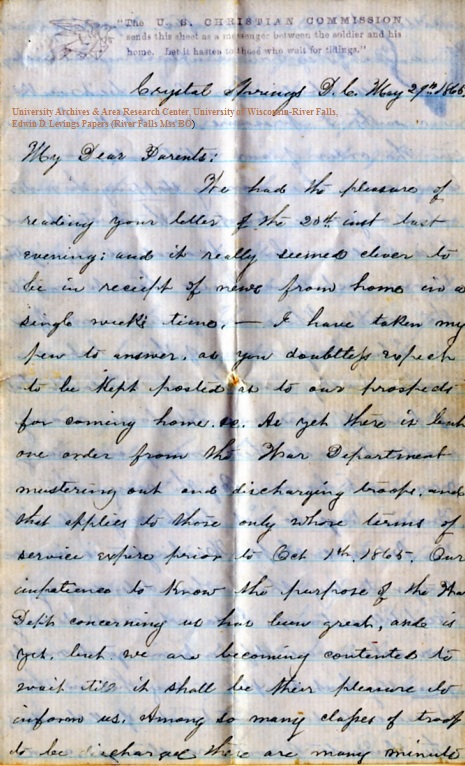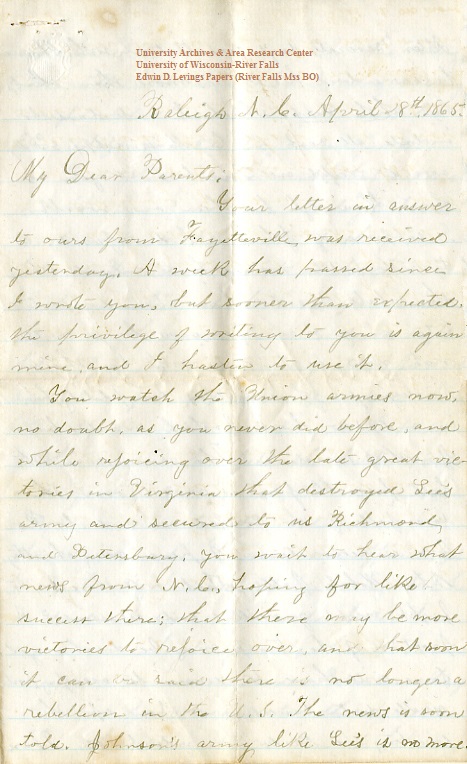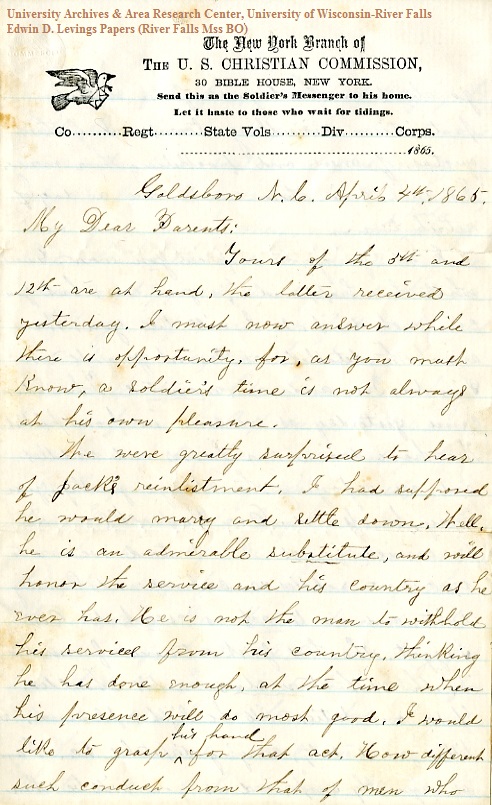Edwin Levings with the 12th Wisconsin Infantry writes to one of his cousins. The original letter is in the Edwin D. Levings Papers (River Falls Mss BO), in the University Archives and Area Research Center at the University of Wisconsin-River Falls.
Hd. Qrs. 3rd Div, 17th A. C.
Near Louisville Ky, June 20th 1865.
Dear Cousin Emma;¹
Your letter of the 6th May was rec’d near Washington, and read by me with much pleasure. Like one awaiting the return of some long absent friend, it seemed to have been in waiting there to greet me at the end of a long, toilsome march. Coming back from the war, my mind filled with bright visions of home and friends, the arrival of your letter was a most pleasing — incident — a compliment — an honor, as are all your letters.
And now while you are looking for “another army letter”, I gladly pen these lines, hoping they may confer as much pleasure and interest as felt by me when tracing yours.
Now that an armed foe no longer assails the Old Flag, I must write of other things than the scenes and incidents of war, and what shall they be? My purpose was to write a short sketch of our march from Raleigh N.C. to Washington; but the thought occurs that from previous letters you must be quite familiar with the features of interest in a march, for though varied, they are much alike in each instance, and therefor I will not invite you to a perusal of what might be but little better than an old story. I will say it was the most pleasant and agreeable march ever performed by us. We had been detailed for Provost duty at Division Head Quarters, and being mounted on horses, with the privilege of going where we wished, had an excellent chance to see the country and the people, remaining as safeguards at the houses during the passing of the troops, and sometimes stopping over night. Every body was seemingly glad the war was ended. Numerous questions were asked about the North and the Yankees, and more than once I tired with talking. By the way would you believe it —some of the fair ones asserted their liking for the Yankees, and said they would marry the first favorable chance. Further, some of Raleigh’s daughters actually made peace with some of Uncle Sam’s boys by marrying them. This demonstrates conclusively that there is yet in Dixie a real love for the union. Now who says the war was a failure, when it ended by making lovers of enemies? A different turn of the wheel of Fortune some of the northern girls may think, and what do you suppose they will say? The trip I shall always remember with satisfaction. I would give some of the conversation but for the fear of spinning this out to too great a length.—While in Washington we visited all the sights. The Patent Office, Capitol Buildings and Smithsonian Institute are the principal places of interest and are well worth going to see. I must not attempt to say what we saw, as my letter would be too long, so you must excuse me.
You seemed to think the soldiers were all coming home, I am sorry to say they are not, that the veteran portion must remain awhile longer. The Government determined to retain us till such time as it should be deemed prudent to disband us. We hardly knew how to endure the disappointment, but are now somewhat resigned to the decree, hoping the “good time coming” is not far distant. I presume we shall be held till the different States can reorganize their government and assume the control now exercised by the military authority. So you see our going home soon is all illusion. But I can not but think our services will not be required more than six or eight months longer.
At Washington we saw cousin Ellsworth [Ellsworth Burnett]. He looks well, and has a high reputation in his Co. and Regt. Dwight, who lives in Alexandria, we did not see. Myron [Myron W. Packard], in the 3oth Wis., is here on duty at the military prison as Commissary Serg’t.²—The Div. is now being paid, and a liberal percentage of furloughs granted. We drew lots for them here, but neither of us got one. I never was lucky at that business and don’t suppose I ever will be. Our duty here at Hd. Qrs. is mostly pacing to and fro before the officers’ tents, saluting when necessary, or I should say, whenever you can not avoid it. All style. Like unto the contraband’s³ duty —”brushing the flies off from missus”. You can guess whether that suits a Levings. The time we must remain in the army will be long to us, and I shall have to call into exercise more than usual patience to stand it. Now, Dear Cousin, as I have before told you, letters are the life of a soldier, in an important sense &, I hope you will let your and Cousin Louisa’s letters will come faster. I have no idea that mine will be worthy your attention, but I shall ever be grateful for your correspondence, as having made many an otherwise lonely hour in my soldier-life happy. I am a poor hand to ask questions where I have never been, and you will have to anticipate then for what I would say. My letter is a sorry looking thing, and can you make out what I have said, I can not, therefore will stop writing. May we hope to hear from you soon. Direct via Louisville. With my well-wishes to you, I am
Your Cousin
. .Edwin
1. Cousin Emma Eliza Levings (b. 1842), along with sisters Lottie (Charlotte Amelia, b. 1845), Hattie (Harriet Lucinda, b. 1849), and Lucy Louisa (b. 1840), were the daughters of Edwin’s and Homer’s Uncle Alpheus Hall Levings.
2. Here are some of the male cousins. Ellsworth Burnett was the son of Edwin’s and Homer’s Aunt Mary Levings Burnett (married Benedict R. Burnett). Myron W. Packard was the son of Edwin’s and Homer’s Aunt Amanda Levings Packard (married Daniel Packard). Dwight was probably Dwight Cornelius Packard (1829-1910), Myron’s brother and also Edwin’s and Homer’s first cousin.
3. During the War, escaped slaves were considered contraband.
.










